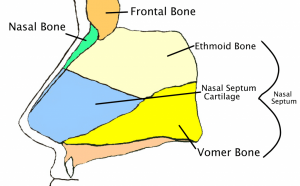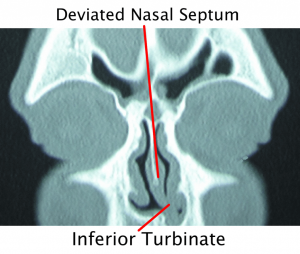Your path to breathing better begins here: Solve your deviated septum issue
If you’re in Manhattan and finding it hard to breathe through your nose, it could be a sign of a condition called a deviated septum; a shift in your nasal pathways that can lead to breathing difficulties and other issues. Dr. Mourad specialises in diagnosing and treating nasal conditions, offering expert deviated septum surgery (septoplasty) to help restore clear breathing and comfort.
Relieve your breathing problems with septoplasty in Manhattan – Meet with Dr. Mourad
Septoplasty Procedure to Improve the Nasal Passages
Septoplasty is a surgical intervention designed to correct issues related to a deviated septum, with the primary goal of improving airflow through the nasal passages. This procedure is typically performed on an outpatient basis and involves carefully repositioning or reshaping the cartilage and bone within the nose. By addressing structural irregularities, septoplasty can enhance the overall nasal framework and may reduce common symptoms such as difficulty breathing, nasal congestion, and associated discomfort.

How Can Dr. Mourad Improve my Quality of Life with Deviated Septum Surgery?
Many of our patients from Manhattan visit us after trying a variety of treatments such as nasal steroid sprays, decongestants or antihistamines, yet still find themselves struggling to breathe comfortably. We take the time to review all available treatment options with you so that you feel informed and confident in your care plan. Our team will also verify your insurance benefits and assist with the process as much as possible. Dr. Mourad, a leading expert in all types of nasal surgery, is always happy to discuss your individual needs and provide the highest standard of care.
Do I Need a Septoplasty?
Whether septoplasty is necessary depends on the presence of a deviated septum that is contributing to health concerns or symptoms that noticeably impact daily life. Common issues include difficulty breathing through the nose, recurrent sinus infections, frequent nosebleeds, loud snoring, and sleep apnea.
Initial approaches often involve managing these symptoms with non-surgical options such as prescription or over-the-counter nasal sprays. However, when nasal symptoms are severe or persistent, septoplasty surgery becomes the recommended solution. If you are experiencing these challenges, scheduling a consultation at our NYC clinic for a thorough evaluation by a facial plastic and reconstructive surgeon is the best next step.

Common Symptoms of a Deviated Nasal Septum
Recognizing a deviated septum typically begins with observing symptoms such as persistent nasal obstruction, discomfort or pressure in the facial area, and repeated sinus infections. When these issues interfere significantly with breathing or daily life, surgical correction through septoplasty may be recommended to adjust and realign the cartilage and bone within the nasal passages.
- Sleep Apnea and Other Sleeping Problems: A deviated septum can play a role in obstructive sleep apnea by interfering with proper airflow while sleeping. This disruption in breathing patterns can lead to restless nights and daytime fatigue. Septoplasty may be advised to correct the nasal structure and improve airflow, supporting better quality sleep and reducing sleep-related complications.
- Chronic Nose Congestion or Nasal Obstruction: Long-standing nasal blockage, often caused by a deviated septum, can make normal breathing difficult. Surgical correction of the nasal cartilage and bone can restore proper airflow, alleviate congestion, and enhance overall breathing comfort.
- Chronic Sinusitis and Sinus Infections: A misaligned septum can contribute to repeated sinus infections by impeding natural drainage. Surgical adjustment of the nasal septum can reduce the frequency of infections by improving airflow and promoting better sinus health.
- Nasal Discharge (Runny Nose): A deviated septum can affect the nasal lining, leading to excess nasal discharge or a consistently runny nose. Surgical correction can help restore normal nasal function and reduce unwanted drainage.
- Nasal Polyps: Soft, painless, noncancerous growths known as nasal polyps may develop in conjunction with a deviated septum. These growths can obstruct nasal passages, diminish the sense of smell, and increase the likelihood of infections, making surgical intervention beneficial in some cases.
- Symptoms Similar to Allergies: Sneezing, congestion, and other symptoms that resemble allergic reactions can sometimes result from structural issues caused by a deviated septum. Proper evaluation is important to distinguish between allergies and nasal structural problems, which may require surgical correction for effective treatment.
Why Choose Mourad NYC for Septoplasty Surgery in Manhattan?
Selecting Mourad NYC for septoplasty surgery provides you with access to surgeons who have advanced expertise in the delicate structures of nasal anatomy and refined surgical techniques. This Manhattan-based healthcare facility focuses on delivering personalised care that considers both functional and aesthetic elements of nasal health. Whether you are seeking relief from nasal obstruction, managing the effects of a deviated septum, or exploring additional procedures such as rhinoplasty, Mourad NYC offers state-of-the-art technology and a thorough, patient-centred approach. Placing your trust in Dr. Mourad’s extensive experience means relying on a facial plastic surgeon devoted to achieving the best possible results and a smooth recovery. Enhance your quality of life and improve your quality of sleep with septoplasty in Manhattan.
Learn More About Deviated Septum Surgery at Mourad NYC
What is a Deviated Septum?
A deviated septum develops when the cartilage and bone that make up the nasal septum—the wall dividing the nostrils within the nasal cavity—are misaligned or displaced from their normal position. This structural variation can arise due to injuries, such as trauma to the nose, or from developmental factors present at birth. Such a deviation may lead to symptoms including chronic nasal congestion, difficulty breathing through the nose, and the formation of nasal polyps. Surgical procedures, such as septoplasty or rhinoplasty, can correct these structural issues, improving airflow and enhancing overall nasal function.
Does Health Insurance Pay For This Type Of Nasal Surgery?
Most health insurance plans typically cover functional nasal surgeries, meaning procedures designed to improve the function and performance of the nose. At our New York City office, we carefully review your insurance benefits and provide a clear explanation of any potential costs you may be responsible for in the event that septum surgery is required.
We make it a priority to avoid any unexpected expenses for our patients in Manhattan and the rest of New York and keep you fully informed throughout the entire process. This includes explaining co-pays, deductibles, and coinsurance amounts so you can plan accordingly. Our goal is to make high-quality care accessible while respecting the financial responsibilities that patients have. It is important to note that cosmetic procedures, such as aesthetic rhinoplasty, blepharoplasty, and other elective surgeries, are not covered by insurance and would require separate arrangements.
What is the Cost of a Septoplasty Surgery in NYC?
The typical cost of facial plastic surgery to correct a deviated septum in New York City generally ranges from around $4,000 to $10,000. It is important to remember that this figure is only an estimate, and the actual amount a patient may pay can vary based on individual circumstances and the complexity of the procedure.
When evaluating the total cost of septoplasty in NYC, several factors should be taken into account. These include the surgeon’s professional fee, anesthesia services, operating room expenses, and post-operative care. For a more precise cost estimate that considers your unique nasal structure, as well as any additional techniques or rhinoplasty procedures that might be necessary, it is best to schedule a consultation with a qualified nose surgeon who can provide a detailed assessment.
What is the recovery time following septoplasty?
Recovery after a septoplasty procedure can differ from one patient to another, but in general, individuals can anticipate returning to non-strenuous daily activities or work within about one week following surgery. Full healing and the complete reduction of internal nasal swelling may take between three to six months. During the initial weeks after surgery, it is especially important to avoid physically demanding activities, refrain from blowing the nose, and steer clear of any situations that could result in trauma to the nasal area.
Are There Other Conditions That Can Block Your Nasal Airway?
Beyond septal deviation, there are additional conditions that can interfere with normal nasal airflow, including turbinate hypertrophy, the presence of nasal polyps, and chronic sinus infections. Carefully considering the potential risks and benefits of surgical treatments, such as septoplasty, is crucial for addressing these conditions and ensuring optimal nasal function.
What are potential risks of deviated septum surgery?
Undergoing septoplasty, as with any type of surgery, requires patients to have a clear understanding of the possible risks and complications associated with the procedure. Being informed about these potential outcomes helps ensure that individuals can make well-considered decisions about their care and recovery.
Nose Infection
Infections can occur within the nasal cavity or at the site of surgery, presenting a potential complication. Following all post-operative care instructions carefully, including taking prescribed antibiotics, is essential to minimize the risk of infection and to support proper healing.
Septal Perforation
A septal perforation, which is the formation of a hole in the cartilage of the nasal septum, is an uncommon but serious complication. This condition can disrupt airflow through the nose and might require further medical or surgical treatment to correct.
Prolonged or Intense Pain
It is normal to experience some pain after surgery, but there is a possibility of pain lasting longer or becoming more severe. Such situations can occur if complications arise, such as the formation of a hematoma or challenges in nasal tissue recovery.
Facial Pain
Alterations to nasal bones or cartilage during the procedure may result in facial discomfort. It is important to discuss any concerns about potential facial pain during pre-surgery consultations to ensure realistic expectations.
Persistent Nasal Congestion
While some congestion is normal during recovery, extended or severe nasal blockage may indicate complications in the healing process or changes to nasal airflow. Close monitoring of these symptoms is recommended.
Nasal Packing Complications
Nasal packing is sometimes used to control post-operative bleeding, but it can cause discomfort and may lead to additional complications if not handled carefully. Proper removal techniques are necessary to prevent further issues.
Alterations to Nasal Structure
Surgical procedures can change the shape and structure of the nose, including cartilage and bone adjustments. Discussing desired outcomes thoroughly with your surgeon beforehand is critical to avoid any unexpected or undesired results.

